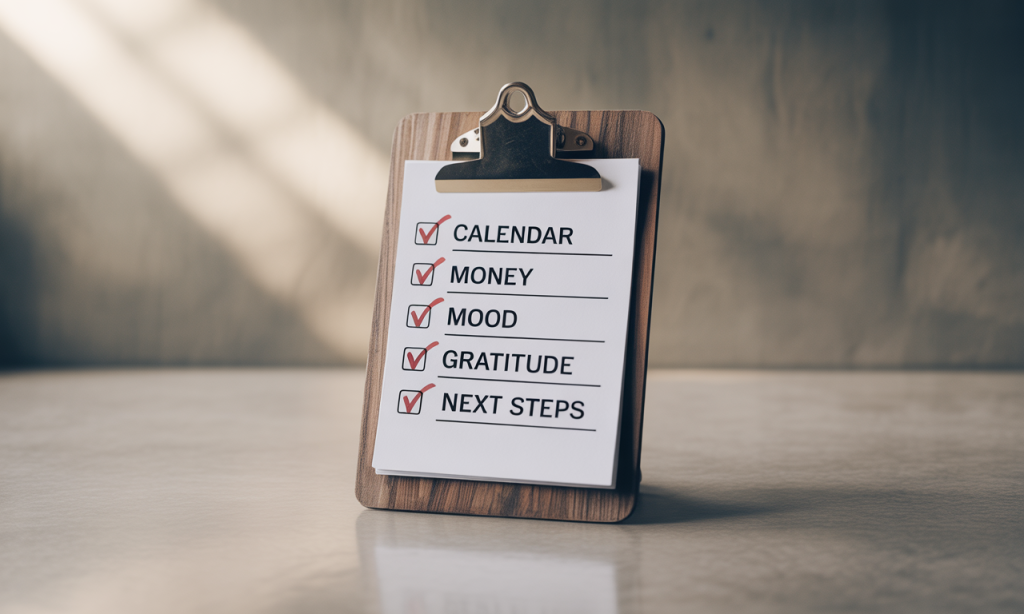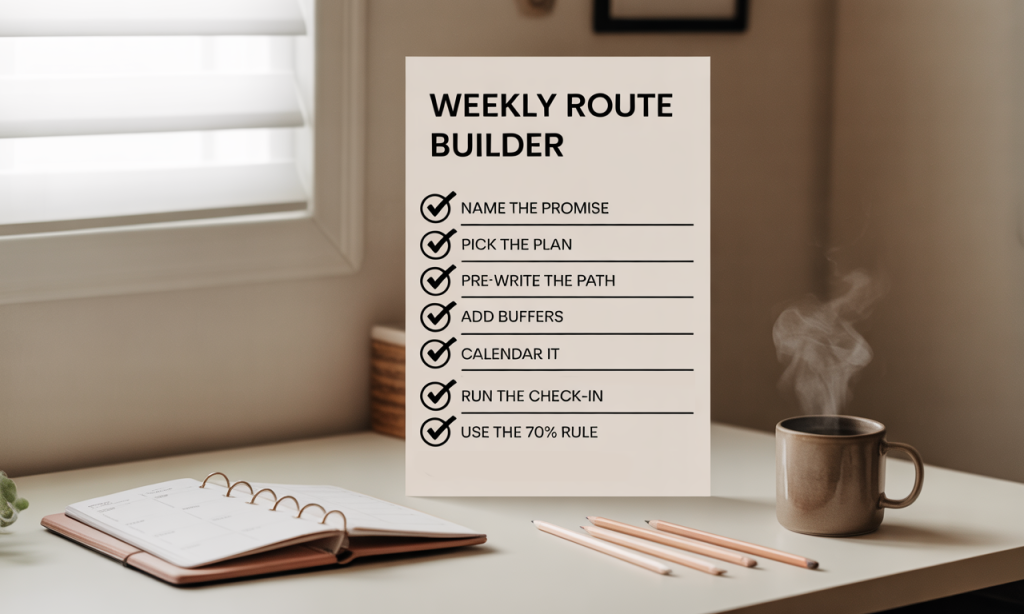Stop Blaming the Weather: Owning Your Route Through Resistance

If you’ve ever yelled at traffic for making you late, you already understand how we treat marriage when life doesn’t cooperate. Weather happens; routes are chosen. Instead of arguing with delays, owning your route through resistance means you design rituals, alternative plans, and a mindset that expects friction—so you still arrive together. This guide gives you a practical route-planning framework for your relationship, including pre-decided habits, backups, and buffers. For weekly navigation, read The Check-In Habit. For flexibility when plans change, see Keep the Promise, Change the Plan.
Why “Owning Your Route Through Resistance” Matters Now
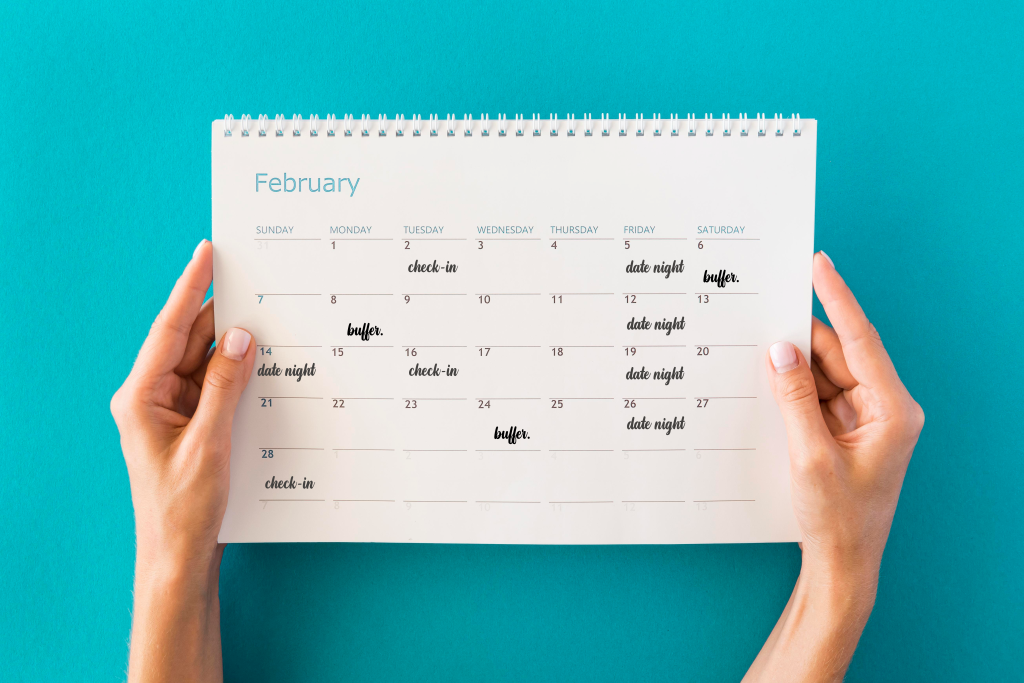 Everyday life has built-in headwinds: sleep debt, kid schedules, workload spikes, mismatched expectations, cultural differences, and occasional “Acts of Life” like illnesses and outages. None of these are conspiracy-level obstacles. They’re weather. The mistake is pretending weather is exceptional. It isn’t. It’s normal. When you start owning your route through resistance, you stop waiting for perfect conditions and begin planning for real ones.
Everyday life has built-in headwinds: sleep debt, kid schedules, workload spikes, mismatched expectations, cultural differences, and occasional “Acts of Life” like illnesses and outages. None of these are conspiracy-level obstacles. They’re weather. The mistake is pretending weather is exceptional. It isn’t. It’s normal. When you start owning your route through resistance, you stop waiting for perfect conditions and begin planning for real ones.
Couples who struggle often think love should be “natural,” which becomes code for “unplanned.” But unplanned means unprotected. In travel, you wouldn’t insist on “winging it” through rush hour without checking the route. Why do that with connection? Love thrives when it’s routinized with room for surprise—not when it relies on luck.
The Route Design Model: Promise → Plan → Path
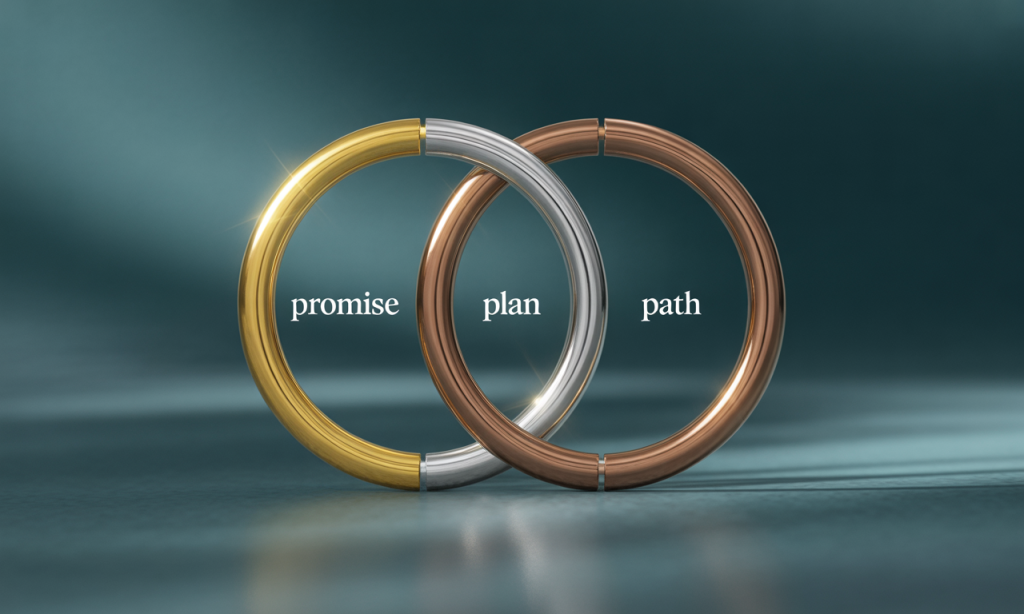 Think like a navigator. Your relationship route is made of three layers:
Think like a navigator. Your relationship route is made of three layers:
1) Promise (Destination):
What you value and intend to keep—closeness, kindness, weekly connection, spiritual practices, intimacy.
2) Plan (Primary Route):
The main way you keep the promise—Friday date nights, Sunday planning, nightly wind-down talk.
3) Path (Alternatives & Buffers):
Your backups and “rain dates” when weather hits—Saturday lunch instead of Friday dinner, 10-minute mini-check-in if you miss the weekly, a one-sentence blessing when you’re exhausted.
The promise is non-negotiable; the plan is flexible; the path is prepared in advance. This is the beating heart of owning your route through resistance: you keep the promise and change the plan.
Expect Friction: The Five Predictable Headwinds
 Anticipating headwinds lets you design smarter routes. Here are five common categories:
Anticipating headwinds lets you design smarter routes. Here are five common categories:
Time Headwinds: Work shifts, kid activities, travel.
Energy Headwinds: Fatigue, stress, illness, recovery days.
Attention Headwinds: Screens, social media loops, scattered focus.
Logistics Headwinds: Babysitter cancellations, traffic, shipping delays.
Mindset Headwinds: Perfectionism (“If it can’t be ideal, skip it”), resentment, passive hope (“Maybe next week”).
You don’t need five different solutions; you need one good operating system. That’s why routines, backups, and buffers outperform motivation.
Pre-Decided Rituals: The Route That Survives Weather
Rituals are pre-booked bridges across busy weeks. They reduce decision fatigue and create automaticity—the less you debate whether to connect, the more you do.
Examples of resilient rituals
- Weekly date night: Same day/time window each week. If Friday fails, Saturday lunch is auto-backup.
- Weekly check-in: Ten minutes with a shared agenda (calendar, money, mood, gratitude, next steps). See The Check-In Habit.
- Nightly wind-down: Five minutes in bed or on the couch: “high/low/thank you.”
- Service swap: Each partner chooses one task to lift off the other’s plate weekly.
- Faith & growth touchpoint: Pray together or read one page from a growth book.
When the ritual is automatic, you’re owning your route through resistance because you’re not renegotiating connection every time the weather changes.
Alternative Plans: Keep the Promise, Change the Plan
If the promise is connection, the plan can move around. Build one-click alternatives so your momentum survives interruptions.
Menu of alternatives
- Date fallback: “If Friday fails by 5 PM, we shift to Saturday brunch.”
- Check-in fallback: “If Sunday evening gets noisy, we do Monday commute voice notes.”
- Intimacy fallback: “If we’re exhausted, we opt for cuddle time + affirmations.”
- Celebration fallback: “If a gift is late, we do a ‘reveal night’ with a handwritten note and a promise date.”
Read: Keep the Promise, Change the Plan. Adjusting plans isn’t failure; it’s agility. You remain owning your route through resistance by prioritizing the promise and flexing the path.
Build Buffers and Slack: Protection Beats Excuses
 Buffers are time and logistics padding that absorb shocks. Slack is the margin you build into gifts, dates, communication, and childcare.
Buffers are time and logistics padding that absorb shocks. Slack is the margin you build into gifts, dates, communication, and childcare.
Practical buffers
- Time: Arrive 15 minutes early to dates; book a sitter 30 minutes longer than you think you’ll need.
- Gifts: Order a week in advance; keep a “gift drawer” with cards and small treats.
- Food: Freeze one date-night meal; keep a go-to takeout order bookmarked.
- Childcare: Maintain a list of two backup sitters.
- Budget: Add a “connection fund” line item so you don’t debate every latte or babysitter.
The more buffers you add, the less fragile your connection becomes. This is owning your route through resistance at the infrastructure level.
The Check-In Habit: Your Weekly Navigation Meeting
A short, structured weekly check-in keeps you aligned and removes surprises. Use a repeatable agenda:
- Calendar: What’s on deck this week?
- Money: Any unusual expenses or limits?
- Mood: One-word check-in; anything we should name early?
- Gratitude: One specific thank-you to your spouse.
- Next steps: Who will do what by when?
This meeting is where you practice owning your route through resistance by plotting around known headwinds. Use this guide: The Check-In Habit.
Micro-Connections: Shortcuts That Still Count
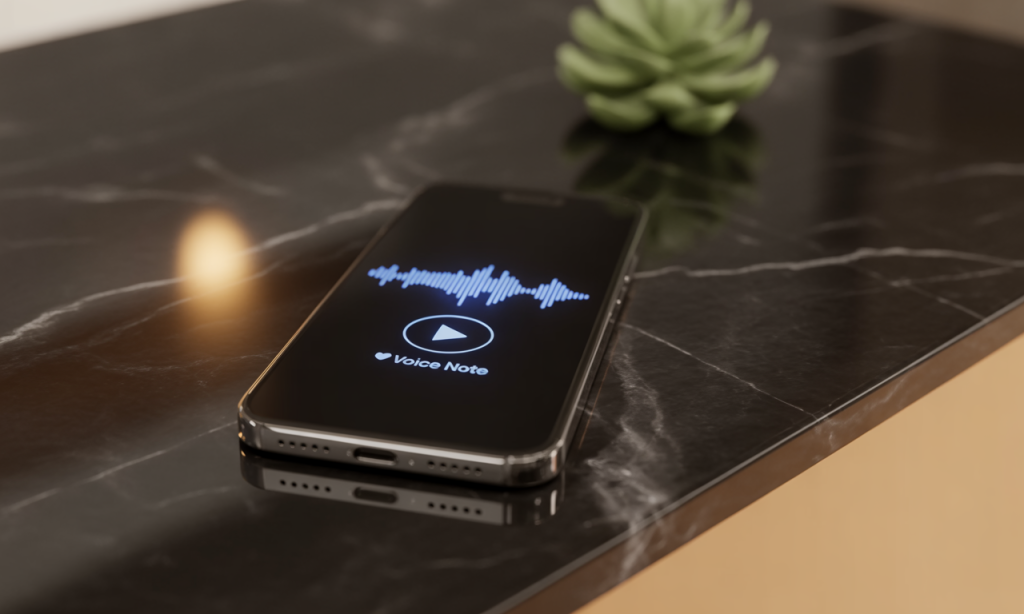 When time is tight, micro-connections keep your bond warm. Five minutes is enough to show care and continuity.
When time is tight, micro-connections keep your bond warm. Five minutes is enough to show care and continuity.
Five-minute plays
- 30-second hug that lasts through the awkwardness.
- A quick voice note after a tough meeting: “Thinking of you.”
- Tea or water delivery to your spouse with a sticky note.
- Two-question text: “How’s your energy? What would help tonight?”
- A one-sentence blessing or prayer before sleep.
Micro-moments stitch the week together, ensuring that owning your route through resistance feels human, not heavy.
Energy Management: Fueling the Route
You can’t drive on empty. Treat your personal energy like shared fuel for the journey.
Energy audits
- Swap scroll for soul: Trade 10 minutes of social media for 10 minutes of presence.
- Sleep and screens: No phones in bed three nights a week.
- Food and movement: Plan two “walk-and-talks” after dinner.
- Social diet: Limit draining conversations; invite uplifting friends.
Couples who manage energy well are better at owning their route through resistance because they’re not showing up depleted every day.
When You Are the Weather: Internal Resistance
 Sometimes the headwind is in your chest. Perfectionism cancels imperfect dates. Pride blocks apologies. Fear resists vulnerability. If that’s you:
Sometimes the headwind is in your chest. Perfectionism cancels imperfect dates. Pride blocks apologies. Fear resists vulnerability. If that’s you:
- Pick the smallest next right action (a two-minute repair or a one-line affirmation).
- Use the 70% Rule: good-enough connection now beats the perfect plan later.
- Ask for help early; don’t outsource leadership of the relationship to your mood.
Owning your route through resistance often starts with self-management. When you manage you, the route gets clearer.
Case Study 1: Friday Date Night That Actually Survives
Scenario: Friday date nights keep failing due to late meetings and sitter issues.
Route Ownership:
- Promise: “We will connect weekly outside the house.”
- Plan: Friday 7–9 PM dinner near home.
- Path: If not confirmed by Thursday noon, switch to Saturday brunch; if sitter cancels, do a living-room picnic after bedtime with a 30-minute phone-free rule.
Result: 3/4 weeks succeed, and the miss turns into a solid home alternative. Momentum sustained.
Link for deeper systemizing: Weekly Date Night Works Because Life Won’t.
Case Study 2: The Late Gift “Disaster”
Scenario: Amazon delay ruins the exact birthday plan.
Route Ownership:
- Promise: “Your birthday feels seen and special.”
- Plan: Gift + dinner on the date.
- Path: If the gift is late, switch to a “reveal night” with a handwritten letter and a promise date scheduled on the first open evening; gift is presented when it arrives.
Result: Birthday still feels cherished; the story becomes playful, not painful.
Read more: Build Buffers, Not Excuses and The Slack Strategy.
Case Study 3: The Week from Everywhere
Scenario: Kids’ activities, deadline stress, and mild illness derail the routine.
Route Ownership:
- Promise: “We stay connected even on hard weeks.”
- Plan: Normal schedule is too heavy.
- Path: Drop to “bare minimum beautiful”—one micro-connection daily, a 10-minute check-in, and a 20-minute couch date with snacks and a show you both like.
Result: Connection maintained; the week doesn’t sever intimacy or start a distance spiral.
Pair with: The 70% Rule.
The 7-Step Weekly Route Builder
Use this step-by-step to design your route together:
- Name the Promise. What will be true even on hard weeks?
- Pick the Plan. Choose a day/time for your top ritual (date, check-in).
- Pre-Write the Path. One backup per ritual—decide it now.
- Add Buffers. Time padding, backup sitter, gift drawer, food plan.
- Calendar It. Recurring events with reminders. Treat them as “already spent time.”
- Run the Check-In. Navigate the week ahead. See The Check-In Habit.
- Use the 70% Rule. If perfect fails, do the good-enough version now.
By following these steps, you are owning your route through resistance instead of blaming the weather.
Scripts You Can Use This Week
Sometimes you just need words:
- Plan-to-Path Switch: “I want to keep our promise even if tonight’s plan won’t work. Let’s move the date to tomorrow brunch so we still get time.”
- Micro-Connection Ask: “Five minutes to land the day together? High/low/thank you?”
- Energy Honesty: “I’m running low. I can give 15 minutes of full attention now or mornings this week—what would feel best to you?”
- Repair Starter: “I’ve been acting like the weather is responsible for us. I want to own our route. Here’s my next step.”
Keep these accessible. Language is the lever that moves behavior.
Metrics That Matter (Because What Gets Measured Improves)
Track simple, meaningful signals:
- Weekly connection streak: How many weeks in a row did you keep a date/check-in?
- Fallback activation count: How often did you use Plan B? (High early on is normal.)
- Micro-connection frequency: How many days this week did you do a 5-minute touchpoint?
- Repair speed: Time from friction to a repair attempt.
- Energy score: Rate your daily energy (1–5) and share. Use it to schedule smarter.
These metrics help you see whether you’re owning your route through resistance or leaving connection to chance.
A 30-Day Route Sprint
Try this four-week sprint to lock in the operating system:
Week 1: Map & Promise
- Identify your top three headwinds.
- Agree on a weekly promise and primary plan for one ritual.
Week 2: Buffers & Backups
- Add one buffer per ritual.
- Create your fallback menu and put it on the fridge.
Week 3: Micro-Mastery
- Log five micro-connections over the week.
- Run two walk-and-talks.
Week 4: Review & Adjust
- In the check-in, rate each element 1–5.
- Improve one item by 1 point (e.g., earlier sitter booking).
By the end, owning your route through resistance will feel normal, not forced.
Common Pitfalls (And How to Avoid Them)
- All-or-Nothing Thinking: If it can’t be perfect, it’s not worth doing.
Antidote: The 70% Rule and micro-connections. - Plan Without Promise: Scheduling without values feels like chores.
Antidote: Start with the promise—why this matters to you both. - Promise Without Path: Dreaming of closeness without backups creates fragility.
Antidote: One pre-decided fallback per ritual. - Hidden Resentments: Scorekeeping turns weather into warfare.
Antidote: Name feelings early in the check-in; ask for what you need. - Unclear Ownership: “You plan it.” “No, you.”
Antidote: Rotate the role of weekly navigator or co-own planning during the check-in.
Your Next Right Move
- Put a recurring weekly check-in on the calendar. Use the five-point agenda.
- Create a date-night fallback sentence and add it to your shared notes.
- Stock a connection drawer with cards and small treats.
- Send a 30-second voice note before you move to the next task.
If you do just one thing today, take five minutes together to plot this week’s route. Weather will happen. Routes are chosen. When you commit to owning your route through resistance, you stop losing connection to predictable delays and start enjoying a relationship that actually arrives where you said you’d go—together.




